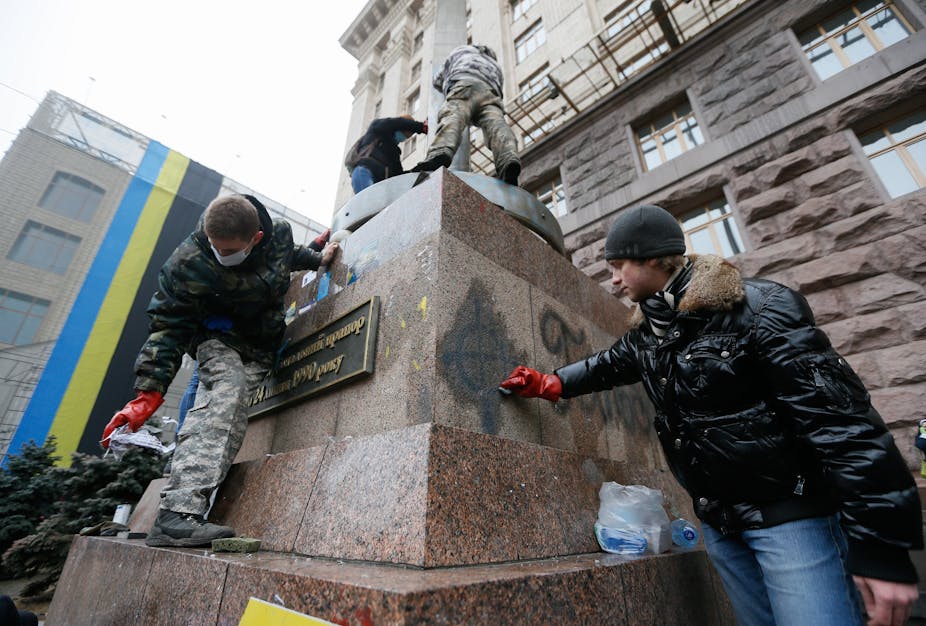In the year since the conflict in Eastern Ukraine began, more than 4,000 lives have been lost. Fighting continues despite the ceasefire agreement signed in September 2014 and the major powers involved in the conflict – Ukraine, Russia, the European Union and the United States – are no closer to an acceptable diplomatic solution than they were in November 2013.
And while the conflict continues, a major economic crisis is looming. This will hit ordinary people in both Ukraine and Russia and should be a major concern to global powers. At the same time though, it may also provide a way out of the stalemate.
Superficial friends
Even though the eyes of the world have been on Ukraine for 12 months, the country appears no more significant in regional and global affairs than it was in autumn 2013. As a sovereign political entity, Ukraine continues to be treated as a secondary power by both the West and Russia. It is a playing card between major powers in the wider geopolitical game. It’s a situation that suits the Kremlin well and does little to resolve the conflict.
Part of the reason for such an eclipse is that the ongoing war aggravates the structural divide between the western and eastern parts of Ukraine. That makes it difficult for the authorities in Kiev to function as a unified political entity.
But it is also an external problem. Europe was quick to support the uprising in Kiev a year ago. It was, after all, prompted by opposition to the then government’s decision to pull out of closer ties with the EU in favour of Russia. But Europe clearly wasn’t prepared for the political realities in the new Ukraine.
Western leaders have made friendly diplomatic gestures to new president Petro Poroshenko and promised financial assistance, but have so far paid little attention to the deteriorating political-economic situation or the social environment inside Ukraine.
Now though, they really need to start taking notice. With output set to contract by 7% this year, the economy is shrinking and currency is rapidly losing value, fuelling speculative shadow currency markets. Ukraine is in deep debt. Cut off from Russian gas supplies, some experts are predicting a repeat of the September 1998 default.
Meanwhile, Western policy focuses obsessively on Vladimir Putin and Russia’s geopolitical tactics. The spiral of economic sanctions and diplomatic tensions between Russia and the West has assumed a life of its own. This thread is evolving almost independently of the conflict in eastern Ukraine.
Cash strapped
If the first year of this conflict was dominated by issues of identity, security, sovereignty and statehood, the second year is likely to be defined by this unfolding economic crisis, both inside the country and in its neighbouring markets.
Even with financial assistance from the International Monetary Fund and other parties, the government in Kiev has to launch a series of painful reforms, the costs of which will fall on ordinary people through their wages, pensions and social security. The inevitable economic pain of reforms will put pressure on Poroshenko. His major electoral mandate was to end the conflict in the east of the country and he will doubtless lose popularity when cuts start to bite. When economic recession hits, political and social tensions may well escalate and bring further political uncertainty.
In economic terms, things aren’t looking great for Russia either. GDP growth slowed to 1.3% in 2013 and the economic recession, caused chiefly by lower oil prices, may shrink the Kremlin’s political leverage in the future.
Putin’s popularity has not waned particularly as a result of his actions in Ukraine but it is firmly based in the continuing trend of rising living standards in Russia. High oil prices during his two terms in office have allowed the country to expand its state sector.
Oil revenues have been stashed in two special sovereign funds estimated to be worth US$370 billion. This has been a key financial cushion in Russia’s bid as a major power on the global political map. But the reserves are dwindling, not least as a result of battling the fall in value of the rouble.
This might actually turn out to be a good thing. It could even force some resolution to the conflict. The Kremlin needs to address these economic problems and may well have to take its attention away from foreign affairs to do it.
Although the coming economic struggle will be difficult for the general public, Ukrainians and Russians have built up a resilience to hardship. To avert disaster, both nations need to spend more time over the next year looking inwardly at their financial health. That could eventually prove more effective in ending the conflict in eastern Ukraine than international diplomacy has been.

